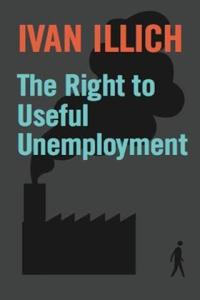In The Right to Useful Unemployment, Ivan Illich suggests that we need to break the association of the definition of work with that of the coupling of labor force and capital. For him, we must replace the status of the social relationship that commands production with the beneficial outcomes of effort; the achievement of satisfaction which flows from action.
He suggests 3 principle ideas: that in commodity based societies the sheer abundance of commodities paralyzes the autonomous determination of use-value, that professions play a hidden role in society by shaping its needs, and that we must illuminate the illusions and break the professional power that perpetuates market dependance. Essentially, the power of professions to measure what is good, right, and done warps the desire, willingness, and ability of the “common person” to live within their means.
Unemployment means idleness, rather than the freedom to do things which are useful for oneself or ones neighbor. An active person who maintains a household and raises children while taking in those of others is distinguished from one who “works” no matter how damaging or useless the product of that work may be. Housework, handicrafts, subsistence agriculture, radical technology, learning exchanges, and the like are degraded as fringe activities for the idle, the unproductive, the very rich, or very poor.
The quality of a society and it’s culture depends on the status of it’s unemployed. We must protect the freedom of people to be useful outside the activities that result in the production of commodities. This depends on the rational and cynical competence of the common person when faced with the professional imputation of needs.
Ultimately, Illich says we need to destroy the symbolic power of expertise, and that professional establishments protect their legitimacy in 3 principle ways: Professional self policing, professional alliances, and the professionalization of clients, often in the form of “self-help.”
Illich suggests we must shift towards a participative conception of justice, and resist training for extreme specialization.

